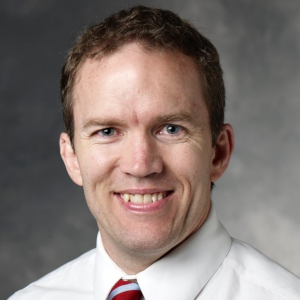Biography
Dr. Esplin is board certified in clinical genetics and internal medicine with a focus on using comprehensive germline, ctDNA and solid-tumor somatic genomic information to provide cancer patients precision therapies and clinical trials access. This includes the landmark INTERCEPT study (universal germline testing in patients with all solid-tumor cancers) with the Mayo Clinic, which is expanding to generate and integrate somatic tumor testing for all INTERCEPT patients; the PROCLAIM study demonstrating the utility of universal genetic testing for prostate cancer; and the ARTEMIS study, in collaboration with ECOG-ACRIN and the University of Pennsylvania, integrating coordinated germline, liquid biopsy ctDNA and somatic solid tumor sequencing analysis for precision therapy in all patients with early stage pancreatic cancer. Dr. Esplin completed the MSTP program at UT Southwestern obtaining his MD and PhD in genetics. Clinical genetics training at Stanford University was followed by an NIH-funded Tashia and John Morgridge Endowed Postdoctoral Fellowship under Mike Snyder in the Stanford Department of Genetics, where he maintains an academic appointment. He is a fellow of the American College of Medical Genetics and Genomics (ACMG) and the American College of Physicians (ACP).
Talk
Integrating Germline, Liquid Biopsy and Cancer Tumor Testing
Comprehensive, coordinated integration of germline and somatic tumor genetic testing at the time of diagnosis, in combination with liquid biopsy screening and monitoring for disease, is crucial for efficient personalization of precision therapies and improving the early diagnosis, curative treatment and overall survival of patients with all forms of cancer.
Session Abstract – PMWC 2022 Silicon Valley
Track Chair:
Ed Esplin, Invitae
Genetic testing has evolved over time and various applications have successfully made it into the clinical setting. While oncology applications are dominating, we also see a rise in genetic/genomic applications for reproductive health, CVD diagnosis, or early life understanding. Technological advancements are required to scale genetic testing applications delivery including relay of genomic information to clinicians and patients. In parallel to technological challenges, hurdles are also observed when it comes to insight/knowledge extraction, reporting of clinical findings, and scaling of genetic counseling. This track will touch upon these various aspects including successful precision medicine models through biopharma ventures for rare disease understanding and direct to consumer genetic testing.
Sessions:
- Intro to Genetic Testing Applications
- Ed Esplin, Invitae - The Path to Universal Newborn Sequencing and Disease Prevention
- Robert C Green, Harvard - Evolving Paradigms in Genetic Testing Initiated by Consumers
- Paldeep S. Atwal, Everly Health - Models of Successful Precision Medicine through Biopharma Ventures in Rare Disease
- Daniel Anderson, Invitae
- Karen Miga, UCSC - Pairing Somatic Cancer Testing with Germline Testing
- Ed Esplin, Invitae - Scalable Approaches to Relaying Genomic Information to Clinicians and their Patients
- Steven Bleyl, Genome Medical
- Cassie Hajek, Sanford Imagenetics - Lessons Learned from Virtual Genetic Counseling
- Peter Hulick , NorthShore - Sharing Insights On Reimbursement
- Ashley Arthur, GeneDx









